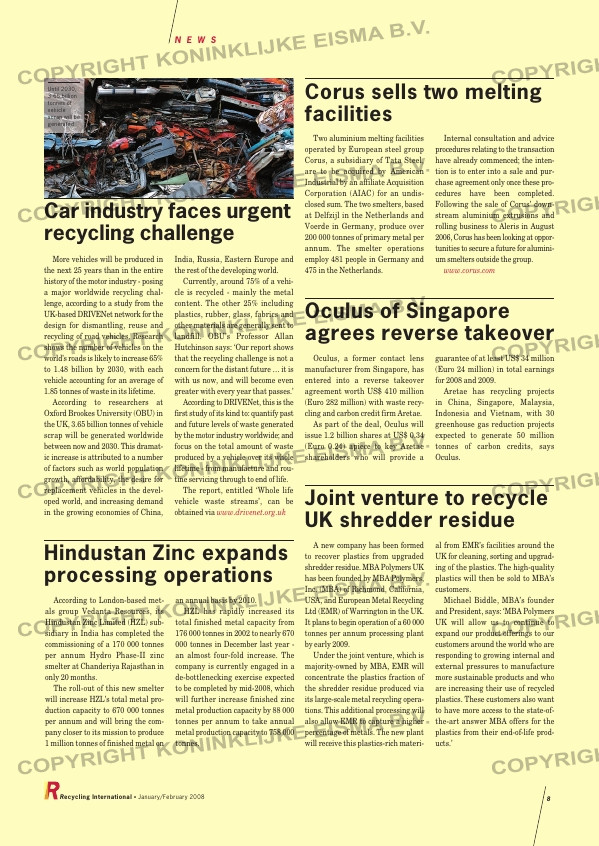Page 8 from: January / February 2008

N E W S
Recycling International • January/February 2008 8
More vehicles will be produced in
the next 25 years than in the entire
history of the motor industry – posing
a major worldwide recycling chal-
lenge, according to a study from the
UK-based DRIVENet network for the
design for dismantling, reuse and
recycling of road vehicles. Research
shows the number of vehicles on the
world’s roads is likely to increase 65%
to 1.48 billion by 2030, with each
vehicle accounting for an average of
1.85 tonnes of waste in its lifetime.
According to researchers at
Oxford Brookes University (OBU) in
the UK, 3.65 billion tonnes of vehicle
scrap will be generated worldwide
between now and 2030. This dramat-
ic increase is attributed to a number
of factors such as world population
growth, affordability, the desire for
replacement vehicles in the devel-
oped world, and increasing demand
in the growing economies of China,
India, Russia, Eastern Europe and
the rest of the developing world.
Currently, around 75% of a vehi-
cle is recycled – mainly the metal
content. The other 25% including
plastics, rubber, glass, fabrics and
other materials are generally sent to
landfill. OBU’s Professor Allan
Hutchinson says: ‘Our report shows
that the recycling challenge is not a
concern for the distant future … it is
with us now, and will become even
greater with every year that passes.’
According to DRIVENet, this is the
first study of its kind to: quantify past
and future levels of waste generated
by the motor industry worldwide; and
focus on the total amount of waste
produced by a vehicle over its whole
lifetime – from manufacture and rou-
tine servicing through to end of life.
The report, entitled ‘Whole life
vehicle waste streams’, can be
obtained via www.drivenet.org.uk
Oculus of Singapore
agrees reverse takeover
Oculus, a former contact lens
manufacturer from Singapore, has
entered into a reverse takeover
agreement worth US$ 410 million
(Euro 282 million) with waste recy-
cling and carbon credit firm Aretae.
As part of the deal, Oculus will
issue 1.2 billion shares at US$ 0.34
(Euro 0.24) apiece to key Aretae
shareholders who will provide a
guarantee of at least US$ 34 million
(Euro 24 million) in total earnings
for 2008 and 2009.
Aretae has recycling projects
in China, Singapore, Malaysia,
Indonesia and Vietnam, with 30
greenhouse gas reduction projects
expected to generate 50 million
tonnes of carbon credits, says
Oculus.
Joint venture to recycle
UK shredder residue
A new company has been formed
to recover plastics from upgraded
shredder residue. MBA Polymers UK
has been founded by MBA Polymers,
Inc. (MBA) of Richmond, California,
USA, and European Metal Recycling
Ltd (EMR) of Warrington in the UK.
It plans to begin operation of a 60 000
tonnes per annum processing plant
by early 2009.
Under the joint venture, which is
majority-owned by MBA, EMR will
concentrate the plastics fraction of
the shredder residue produced via
its large-scale metal recycling opera-
tions. This additional processing will
also allow EMR to capture a higher
percentage of metals. The new plant
will receive this plastics-rich materi-
al from EMR’s facilities around the
UK for cleaning, sorting and upgrad-
ing of the plastics. The high-quality
plastics will then be sold to MBA’s
customers.
Michael Biddle, MBA’s founder
and President, says: ‘MBA Polymers
UK will allow us to continue to
expand our product offerings to our
customers around the world who are
responding to growing internal and
external pressures to manufacture
more sustainable products and who
are increasing their use of recycled
plastics. These customers also want
to have more access to the state-of-
the-art answer MBA offers for the
plastics from their end-of-life prod-
ucts.’
Corus sells two melting
facilities
Two aluminium melting facilities
operated by European steel group
Corus, a subsidiary of Tata Steel,
are to be acquired by American
Industrial by an affiliate Acquisition
Corporation (AIAC) for an undis-
closed sum. The two smelters, based
at Delfzijl in the Netherlands and
Voerde in Germany, produce over
200 000 tonnes of primary metal per
annum. The smelter operations
employ 481 people in Germany and
475 in the Netherlands.
Internal consultation and advice
procedures relating to the transaction
have already commenced; the inten-
tion is to enter into a sale and pur-
chase agreement only once these pro-
cedures have been completed.
Following the sale of Corus’ down-
stream aluminium extrusions and
rolling business to Aleris in August
2006, Corus has been looking at oppor-
tunities to secure a future for alumini-
um smelters outside the group.
www.corus.com
Hindustan Zinc expands
processing operations
According to London-based met-
als group Vedanta Resources, its
Hindustan Zinc Limited (HZL) sub-
sidiary in India has completed the
commissioning of a 170 000 tonnes
per annum Hydro Phase-II zinc
smelter at Chanderiya Rajasthan in
only 20 months.
The roll-out of this new smelter
will increase HZL’s total metal pro-
duction capacity to 670 000 tonnes
per annum and will bring the com-
pany closer to its mission to produce
1 million tonnes of finished metal on
an annual basis by 2010.
HZL has rapidly increased its
total finished metal capacity from
176 000 tonnes in 2002 to nearly 670
000 tonnes in December last year –
an almost four-fold increase. The
company is currently engaged in a
de-bottlenecking exercise expected
to be completed by mid-2008, which
will further increase finished zinc
metal production capacity by 88 000
tonnes per annum to take annual
metal production capacity to 758 000
tonnes.
Until 2030,
3.65 billion
tonnes of
vehicle
scrap will be
generated
Car industry faces urgent
recycling challenge
RI_012 NEWS:Opmaak 1 24-01-2008 09:25 Pagina 8



